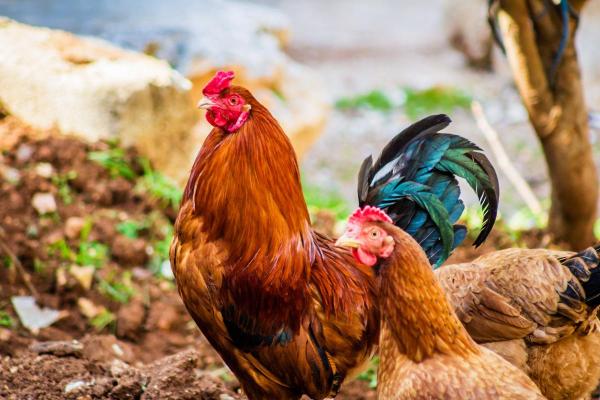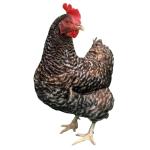Can Chickens Lay Eggs Without a Rooster?



See files for Hens and roosters
Hens can lay eggs without having mated with a rooster. The reason is because of the nature of the chicken reproductive cycle. This is useful for humans since chicken eggs are a staple food in most countries across the world. Despite the ubiquity of hen eggs in the human diet, many of us do not know much about the process of chickens laying eggs.
To learn more about where our eggs come from, AnimalWised asks can chickens lay eggs without a rooster? We look at what circumstances are required for hens to lay eggs and the physiological requirements for egg laying in the female chicken.
Do chickens need a rooster to lay eggs?
No, female chickens do not need a rooster to lay eggs. Roosters do not need to mate with chickens for the female to produce an egg. Also known as hens, female chickens often live with many other females in a coop or a farm. However, this is not necessary for a chicken to lay eggs. It is perfectly possible for a chicken to live on their own and lay as many eggs as one that lives in a group.
The reason for this is that a sexually mature hen will keep producing her eggs, even if they have not been fertilized. This is the same as what happens in other animals, even humans. The difference is that hens are oviparous animals. Oviparous animals lay eggs as part of their reproductive cycle. However, they do not need to be fertilized for the hen to produce them.

Do hens lay more eggs if there is a rooster around?
Hens can lay eggs without the presence of a male chicken, i.e. a rooster. The eggs which hens lay as part of their natural reproductive cycle will be unfertilized unless there is a rooster in the flock. The presence of a rooster is not necessary for hens to lay eggs.
If you do have a rooster in the flock, the eggs have the potential to be fertilized. However, the presence of a rooster does not significantly increase the number of eggs that hens lay. Hens will continue to lay eggs based on their individual breed, age, health and environmental conditions. A rooster's primary role is to fertilize eggs if breeding is desired.
Learn more with our article on how often chickens lay eggs.
Why do chickens lay eggs without a rooster?
As stated above, chickens are types of oviparous animals. This means they lay eggs that develop outside the mother's body. Unlike mammals, chickens do not have internal fertilization. Instead, the process of reproduction in chickens occurs externally. Here's how it works:
- Mating: a rooster and a hen engage in mating. During mating, the rooster transfers sperm into the hen's reproductive tract.
- Sperm storage: hens have a specialized structure called the oviduct, where eggs are formed and travel toward the cloaca, a common opening for the digestive, urinary and reproductive systems. In the oviduct, sperm from the rooster is stored for later use.
- Egg formation: the hen's body produces eggs, one at a time. Each egg consists of the yolk, egg white (albumen), shell membrane, and a calcium-rich shell. As the egg moves through the oviduct, it gets sequentially coated with these layers.
- Fertilization: fertilization occurs when the sperm from the stored spermatic glomera in the oviduct combines with the yolk. This usually happens within the first 30 minutes to a few hours after egg formation.
- Egg laying: the fertilized egg continues its journey through the oviduct until it is laid by the hen. Once the egg is laid, it can develop outside the hen's body without the need for further contact with the rooster.
- Incubation: if the fertilized egg is kept in appropriate conditions (e.g. consistent temperature and humidity), it can develop into a chick. This typically occurs in a controlled environment, such as an incubator or under a broody hen. This occurs when a mother hen sits on and incubates her eggs.
As you can see the male rooster is required to fertilize the eggs, but the egg will still be formed even if this does not happen. With a lack of sperm from the rooster only the female ovum will be laid. This is the hard-shelled egg which we eat as food. In commercial egg production, hens are usually kept without roosters, so the eggs laid by these hens are not fertilized. Roosters are only required if we want the hen to birth new chicks.
What do chickens need to lay eggs?
We have just pointed out that egg laying does not depend on the rooster. We have also shown that the presence of a rooster does not affect the amount of eggs a chicken will lay. As long as the hen is sexually mature and healthy, they should produce eggs regularly. There are certain factors which will influence the egg-laying ability of chickens which include the following:
- Feeding: it is essential a hen eats an adequate diet that covers all its nutritional needs if they want to lay eggs. Otherwise, she may not lay any eggs or the ones she does lay may not be well formed. Additionally, the hen must also have access to water. Hens also need proper hydration to lay eggs.
- Light: laying eggs requires a certain number of hours of sunlight. For this reason, in the northern hemisphere, egg laying is more concentrated in the spring and summer seasons. As the days become shorter, they will be less fertile and produce eggs less frequently. This is the reason why chicken farms enclose them to keep them under artificial light throughout the year. We should not do this if we keep chickens as pets.
- Temperature: similar to light, it is important to have the right temperature for hens to lay eggs. They will lay less during the colder months, but it is also important to note that they may stop laying if the temperature is too hot.
- Peace: stress has a negative impact on egg laying. A hen that is stressed because it lives in a small space does not have access to the outside, perceives the proximity of potential predators or is attacked by its peers will find it difficult to lay eggs.
- Health: sick hens will not lay eggs and will of course need to be seen by a veterinarian to determine what is causing the health problem and how to treat it. You can take a look at our article on the most common chicken diseases to learn more.
Before living with a chicken as a pet, it is essential to find out about its basic needs to offer them the best care possible. This means we should focus on providing them with an outdoor space for recreation, shelter from inclement weather, a correct and balanced diet, as well as necessary veterinary care. An adult, healthy and well-fed hen will lay eggs practically every day and they will be a sign of good physical and emotional condition.

Does a rooster lay eggs?
As we have already explained, hens will need the sperm of a rooster to be able to fertilize eggs. This is because the egg is the female gamete which needs to join with the male gamete for fertilization. Male roosters do not produce female gametes, so they cannot lay eggs.
If you need more information on this subject, you can look at our article on the differences between roosters and hens.

If you want to read similar articles to Can Chickens Lay Eggs Without a Rooster?, we recommend you visit our Facts about the animal kingdom category.







